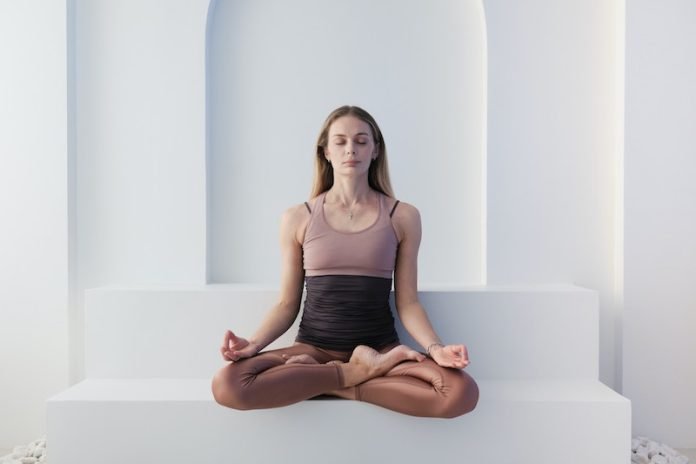
Yoga has long been touted for its physical and mental health benefits.
Now, a new study from the University of Illinois Urbana-Champaign has found that a moderate-intensity yoga program can reduce stress and anxiety levels in full-time working adults experiencing symptoms of stress.
The study was led by associate Professor Sean Mullen in collaboration with researchers from the Beckman Institute for Advanced Science and Technology.
The virtual eight-week program guided participants through three self-paced remote workouts each week.
It assessed levels of stress and anxiety in addition to executive functioning. The results showed overall decreases in stress and anxiety.
The program focused on the sun salutation, a progression of yoga poses that emulates the rising and setting of the sun.
Self-paced instructional videos guided participants through sun salutations in the comfort of their own homes.
Gradually, participants were encouraged to become more self-sufficient by completing the exercises independently.
The researchers wanted to know if learning new chains of yoga sequences could improve working memory, similar to the brain benefits of learning a new dance.
The benefits to executive functioning observed in the study are reinforced by the literature, according to the researchers.
The study also aimed to investigate individuals’ adherence to a virtual exercise program.
While the study was initially designed for remote execution, it’s coincidental timing with the onset of the COVID-19 pandemic provided additional insight.
Another encouraging outcome was the participants’ overwhelmingly positive response.
The lab will continue to test mind-body interventions and promote adherence to exercise by developing more technologies to gamify activities like yoga, kickboxing, and other movements that are more cognitively challenging than standard aerobic exercise.
Their interventions are influenced by Mullen’s personal experience with flow-based training in spinning poi and martial arts like Filipino Kali and Brazilian Jiu Jitsu.
Overall, this study highlights the potential benefits of incorporating a moderate-intensity yoga program into the routines of full-time working adults experiencing symptoms of stress.
The research team’s use of virtual instruction also suggests that such programs can be effectively executed in a remote environment.
The researchers are committed to continuing their research into mind-body interventions and developing new ways to gamify activities like yoga and kickboxing, making them more engaging and inclusive for all individuals.
As more studies demonstrate the cognitive and psychological benefits of these activities, it is becoming increasingly clear that a comprehensive approach to wellness must include not only physical exercise but also mindfulness practices that promote relaxation and stress reduction.
So, if you’re feeling overwhelmed by stress and anxiety in your daily life, it might be worth considering incorporating a yoga practice into your routine.
With a wide variety of instructional videos and classes available online, it’s easier than ever to get started with a yoga practice, even from the comfort of your own home.
And who knows? You might just find that embracing the flow of yoga not only helps you manage stress and anxiety but also enhances your cognitive functioning and overall sense of well-being.
If you care about depression, please read studies about how dairy foods may influence depression risk, and B vitamins could help prevent depression and anxiety.
For more information about mental health, please see recent studies about common medications for anxiety, and results showing some vegetarian diets may be linked to depression.
The study was conducted by Madhura Phansikar et al and published in the Journal of Behavioral Medicine.
Copyright © 2023 Knowridge Science Report. All rights reserved.



